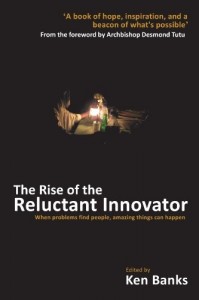Why Give a Damn:
Ken Banks’ work has transformed the lives of many people and shown how the appropriate application of technology can change the world for the better. Here he distills some lessons learned for those that want to make a difference in the world.
The author of this post, Ken Banks, is the founder of kiwanja.net and FrontlineSMS, and devotes himself to the application of mobile technology for positive social and environmental change in the developing world. The following article is excerpted from his upcoming book The Rise of the Reluctant Innovator.
When problems find people, amazing things can happen
When I started out there were few people I could turn to for advice and support, moral or otherwise. That’s the price you pay, I suppose, for getting into something early. But things are different now – I found my purpose, threw everything at it, and came out the other side. I’ve learned a lot along the way, and feel the least I can now do is help others who might be at the beginning of their own journey. Whether that be giving advice or a positive critique on an idea, a shot of encouragement, helping raise awareness through blog posts, giving tips on fundraising, making introductions to other projects and people with the same interests, or offering to be a future soundboard as ideas grow and develop.
Here are a few of the lessons I’ve learned as I stumbled my way through the world of social innovation. I hope some of these prove useful as you travel your own path.
- Ask yourself: do you really understand the problem you’re trying to solve?
- Are you the best person to solve the problem? Be honest, and if not go and support the work of someone else who is.
- Don’t be competitive. There’s plenty of poverty to go around.
- Don’t be in a hurry. Grow your idea or project on your own terms.
- Don’t assume you need money to grow. Do what you can before you reach out to funders.
- Volunteers and interns may not be the silver bullet to your human resource issues. Finding people with your passion and commitment willing to work for free can be time consuming and challenging.
- Pursue and maximize every opportunity to promote your work. Be relentless.
- Suppress your ego. Stay humble. Remain curious.
- Remember that your website, for most people, is the primary window to you and your idea.
- Learn when to say ‘no’. Manage expectations. Don’t overstretch.
- Avoid being dragged down by the politics of the industry you’re in. Save your energy for more important things.
- Learn to do what you can’t afford to pay other people to do.
- Be open with the values that drive you. People will respect you for it.
- Collaborate if it’s in the best interests of solving your problem, even if it’s not in your best interests.
- Make full use of your networks, and remember that the benefits of being in them may not always be immediate.
- Remember the bigger picture, and that whatever you’re trying to solve is bigger than any one person or organization.
- Don’t beat yourself up looking for your passion. You’ll find it in the most unlikely of places, and if you don’t it could very well find you.
- Finally, strive to be a good person, a role model for others. And if you do succeed, remember the importance of giving back.
Fueled by the spread of the Internet and the ubiquity of mobile phones, there are more people working to solve pressing social and environmental problems in the world today than ever before in human history.
For anyone wanting to join them, it is my hope that The Rise of the Reluctant Innovator will show the way, or at least one way, and prove that the only qualifications you need to change the world are a little faith, hope and determination.
The only qualifications you need to change the world are a little faith, hope and determination




